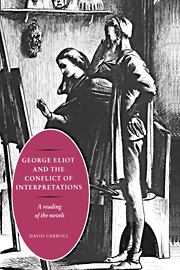Book contents
- Frontmatter
- Contents
- Preface
- Introduction: a working hypothesis
- 1 Scenes of Clerical Life: familiar types and symbols
- 2 Adam Bede: pastoral theodicies
- 3 The Mill on the Floss: growing up in St Ogg's
- 4 Silas Marner: rustic hermeneutics
- 5 Romola: duplicity, doubleness, and sacred rebellion
- 6 Felix Holt: commentaries on the apocalypse
- 7 Middlemarch: empiricist fables
- 8 Daniel Deronda: coercive types
- Conclusion
- Notes
- Index
4 - Silas Marner: rustic hermeneutics
Published online by Cambridge University Press: 17 August 2009
- Frontmatter
- Contents
- Preface
- Introduction: a working hypothesis
- 1 Scenes of Clerical Life: familiar types and symbols
- 2 Adam Bede: pastoral theodicies
- 3 The Mill on the Floss: growing up in St Ogg's
- 4 Silas Marner: rustic hermeneutics
- 5 Romola: duplicity, doubleness, and sacred rebellion
- 6 Felix Holt: commentaries on the apocalypse
- 7 Middlemarch: empiricist fables
- 8 Daniel Deronda: coercive types
- Conclusion
- Notes
- Index
Summary
From the discussion of the early fiction so far it will be clear that there is a doubleness in George Eliot's writing. On the one hand, there is the strong emphasis on life as a kind of muddling through, in which any attempt to articulate a coherent world-view is bound to fail of its very nature. The idea, she says disparagingly in The Mill on the Floss, that ‘men usually act and speak from distinct motives, with a consciously proposed end in view … [is] nowhere abundant but in the world of the dramatist’. ‘We live’, she continues, ‘from hand to mouth, most of us, with a small family of immediate desires’ (22). As a result, the narrative becomes increasingly enmeshed in interpretation as motives proliferate, contradict one another, and escape the constraints of any kind of maxim. But, on the other hand, there is a persistent narrative drive in the fiction towards the simplicity of myth, fable, and melodrama, the need to discover a world where motives are, however briefly, distinct and direct and acted upon. Such motives and actions do not need interpreting, for though they are dramatised in a variety of ways – Janet Dempster in her husband's sick-room, Hetty and Dinah in the prison, Maggie and Tom in the flood – they all take place in milieus where, as she writes in Scenes of Clerical Life, ‘the moral relation of man to man is reduced to its utmost clearness and simplicity: bigotry cannot confuse it, theory cannot pervert it, passion, awed into quiescence, can neither pollute nor perturb it’ (310).
- Type
- Chapter
- Information
- George Eliot and the Conflict of InterpretationsA Reading of the Novels, pp. 140 - 166Publisher: Cambridge University PressPrint publication year: 1992



